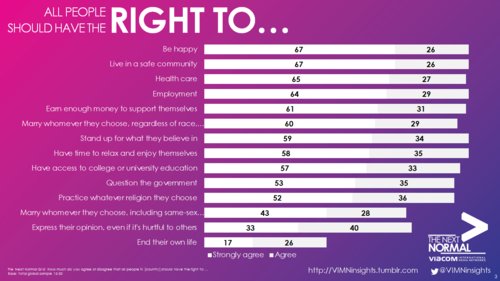Millennial Attitudes to Rights and Responsibilities Around the World
The Next Normal research has indicated that the Millennial generation displays a keen sense of national pride and citizenship – but what does it mean to be a good citizen, and what does the country owe back to its citizens in return?
Responsibilities of people…
Let’s look first at Millennials’ perspective on what it means to be a good citizen – in other words, what are people’s responsibilities in their everyday lives.
As far as the Millennial generation is concerned, the top priorities are around fairness, respect and personal responsibility (standing up for what is right, becoming self-sufficient adults); these general principles of human rights and welfare take precedence over legal and fiscal responsibility – for example, paying tax or abiding by the law.
The scores for these top-ranking areas of personal responsibility are universally high – and indeed this emphasis on respect and care for other people fits entirely with the key characteristics of this generation.
They describe themselves as:
Curious about the world (87%)
Sharing and connecting (87%)
Tolerant (86%)
Flexible (85%)
The importance of reaching out to other people is also evident in the overall high agreement with “be an active member of the community” and “donate time, money or goods to help others in need” – both considered important by over 4 in 5 young people, and particularly strong in Latin America (Mexico and Argentina), the Middle East (Egypt, Saudi Arabia), Asia (China, Singapore, India) and also South Africa, Turkey and Greece (which, of all the European countries, is undergoing the most severe social problems caused by the economic crisis).
The sense of national pride displayed by Millennials (of whom 83% declare themselves proud of their national identity) shines through when we see that 4 in 5 globally believe it is people’s responsibility to speak up in support of their country. The two countries in highest overall agreement on this measure are also among the countries where national pride scores highest – Egypt and Saudi Arabia.
There is also a strong sense of responsibility towards the environment, with over 9 in 10 considering this important – with particularly high scores in Mexico, South Africa, Argentina, Brazil and Singapore (and nowhere does overall agreement dip below 80%).
The importance placed on staying informed about local, national and international events is not surprising given the high degree of curiosity young people demonstrate in terms of what’s going on around them, and it also reflects their digital connectedness where a steady information flow is accessible at the touch of a button. However, it is interesting that they go so far as to say that it is not merely interesting for them to do so but is actually a personal responsibility.
Although a large majority of young people believe people should pay taxes (over 4 in 5), this ranks lower than, for example, protecting the environment or voting. The countries where paying taxes is considered most important are China, Sweden, France, Italy, Argentina, the UK and the USA; while the lowest countries for this measure are Brazil and Saudi Arabia (where total agreement is 63% and 64% respectively).
The matters which rank lowest in terms of personal responsibility are religion and the military. Other data in The Next Normal indicates that young people are just as inclined towards more personal forms of spirituality as they are towards organised religion – which may go some way to explaining the relatively low position of religion here. However, there are some countries where overall agreement about people’s responsibility to practice religion is much higher: Egypt (94%), Saudi Arabia and Turkey (both 81%) – in other words, predominantly Muslim cultures. (More on this topic in a previous blog post).
While on the whole our analysis of Millennials around the globe demonstrates that young people share many common values and aspirations, the military is another issue which divides countries – whether in terms of responsibility to serve in the military or to support it unconditionally. We’ll look into this topic in more detail in an upcoming post.
Rights of people…
Let’s now turn to examining what this generation believes is owed to them as citizens: here we can see that mental wellbeing (happiness, relaxation, a sense of security) ranks above more tangible/material human needs – though Millennials also feel strongly that people should have the right to health care and to earn enough money to support themselves through employment.
Given that this is the “happy generation” (with 3 in 4 describing themselves as “very happy”), it is not at all surprising that “being happy” generates the strongest level of agreement – and this feeling is universal, with the total agreement for “being happy” consistently 9 out of 10 minimum around the world. This also fits with the total agreement score of 93% for the right to time to relax and enjoy oneself – clearly a priority for this generation.

The importance of relaxation to young people today needs to be put in context.
A key finding from The Next Normal is that the event impacting Millennials the most on a personal level is the global economic crash of the late 00s and its fallout:
68% feel personally touched by it with higher numbers in Southern Europe (85%, 84% and 80% in Italy, Spain and Greece), but significant numbers even in countries that escaped relatively unscathed so far like Australia (59%)
This leaves a legacy of fear around future job security: globally, half of the world’s Millennials believe job security will continue to get worse
It therefore follows that the right to employment is considered one of the top-ranking human rights at the strongest agreement level – which of course aligns closely with having enough money to support oneself; and the high score for the right to university access is also linked – we know that young people appreciate the importance of education in order to secure a more stable financial future (85% agree it’s important to study hard when you’re younger in order to get a better job when you’re older).
There is universally high agreement that all three (earning enough to support oneself, employment and access to university) are extremely important rights.
Given that these factors impact so greatly on young people’s lives, it’s little wonder they feel that having some time to relax is vitally important.
As mentioned above, two of the key characteristics of this generation are “sharing and connecting” and “tolerance” – hence 93% agree that people should have the right to stand up for what they believe in (though not so much the right to express one’s opinions if at risk of hurting others). This also applies to the right to question the government (88% total agreement, and particularly high in Mexico, Sweden, South Africa and Canada – the question could not be asked in Saudi Arabia). In the year following the Arab Spring, it is interesting to note that the agreement level in Egypt was 91% – directionally a touch above average, on par with Greece and the USA).
Tolerance extends to the freedom to marry whomever one chooses: 88% in total agree with this. However, same-sex marriage still remains somewhat more divisive an issue – a majority of 71% overall agreeing with it as a human right, but the agreement varies from country to country – see a previous post on this blog.
In this era of openness, tolerance and flexibility, Millennials are also characteristically positive about the right of people to practice whatever faith or religion they choose: on average, almost 9 in 10 – and the only countries where the level dips below 4 in 5 are Saudi Arabia and Japan.
The one issue explored which only a minority agree with is the right to end one’s own life: total agreement of 43%, falling to 23% in South Africa, 24% in Russia, 25% in Greece and 26% in Brazil. The countries most open to people’s right to end their own life are Germany, Netherlands, Spain and UK (all above 60% total agreement).
It is clear – and entirely in keeping with the overall emphasis placed by the Millennial generation on sustaining positivity throughout difficult times – that their focus is on people’s rights to happiness in life. Other rights are important too but ultimately being happy is a key sign of success and therefore a top priority.
“The Next Normal” is the first truly global portrait of the Millennial generation, exploring 9-30 year olds across 24 countries globally.
Christian Kurz is Vice President of Research + Insights for Viacom International Media Networks. Follow Christian at @kurzch.


